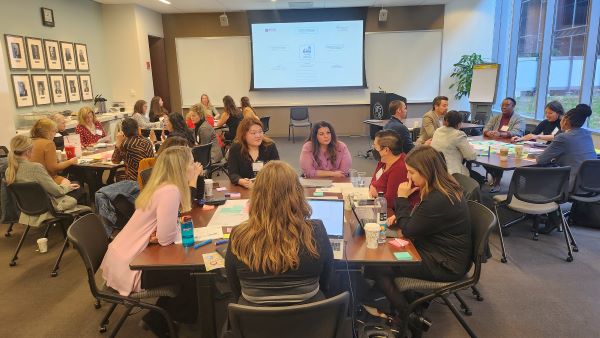A Year of Bold Progress: IFDHE's Journey Towards Health Equity in 2024
The AHA’s Institute for Diversity and Health Equity just wrapped up another distinguished year, where its work resonated with and celebrated AHA members and stakeholders across the field. With multiple convenings held, initiatives launched and an annual conference completed this year, IFDHE stayed the course by working with hospitals and health systems toward an equitable, healthier future for all individuals.
In November, Joy A. Lewis, the AHA’s senior vice president of health equity strategies and executive director, IFDHE, was recognized by the District of Columbia Hospital Association for the Institute’s work in addressing systemic racial and health disparities and empowering hospitals to advance health equity by leveraging the AHA’s Health Equity Roadmap.
Ogechi Emechebe and Hannah Nesich, both senior communications specialists at the AHA, spoke with Lewis to reflect on her team’s greatest wins of 2024 and what’s in store for the future.
Nesich: IFDHE hosted five specialty health equity innovation summits this year — rural health, state hospital associations, patient safety and quality, maternal health, and disability equity. Are there any significant lessons or takeaways you gathered from those summits that you want to share with the field?
JL: There’s a hunger from hospital leaders to better understand how to identify if they’re actually moving the needle in the health equity, diversity and inclusion space. The evidence around key performance indicators are still evolving and developing.
There was also recognition of the growing pushback against diversity, equity and inclusion (DEI). Hospital leaders want to do DEI work; they see its importance; and know the work can improve people’s lives. But the environment is increasingly challenging and it's exhausting for those who are leading the change
We held a webinar in July on the business case for health equity. Not just looking at the moral argument, but why it makes sense from a business perspective — how investing in strategies, programs and tactics that will improve health outcomes, particularly for those who are the most disenfranchised among us, is a business imperative. That was a really powerful webinar. It featured concrete examples of how a specific health system monetized savings, invested in more upstream interventions and saved on the backend in care costs.
Emechebe: If you could summarize IFDHE efforts this year with one word, what would it be and why?
JL: I always come back to BOLD. But it’s really about being intentional around our key messaging and being redundant in our messaging. This is at the crux of change management theory — you must repeat yourself and say the same thing three different times, and maybe in three different ways, for it to stick. We had to be innovative and concise in terms of how we delivered our messaging, sometimes utilizing different or new channels and modalities.

IFDHE and AHA members gather together for the State Hospital Association Innovation Summit in Chicago.
Nesich: What were some challenges, if any, you and your team faced to drive health equity this year, and how do you hope to navigate these challenges in the future?
JL: The current landscape of moving away from DEI is challenging for those who work in the field. For those of us who remain committed to a more equitable and just health care system, it’s more important than ever to come together and do the work coalition-style and thereby amplify our messages and our reach.
The other thing the team has bumped up against is all the competing priorities that our members continue to face — challenges with time, workforce, financial resources and cybersecurity, among others. My team and I view health equity, diversity and inclusion as being foundational to a hospital’s clinical and operational success, not unlike other functions such as human resources or legal. So, we continue to provide resources and strategies to hospitals to help them with their efforts in this space.
Nesich: Looking into 2025, what are some major plans and goals for IFDHE?
Moving forward, we want to build out a strategy to host more state-based health equity innovation summits.
We want to elevate the experience of members who’ve engaged with AHA's Health Equity Roadmap and learn from them — specifically, how has this engagement transformed operations at your hospital? What is your new strategic plan that reflects health equity? On the clinical side, what do your providers have to say about how they’re managing their own bias?
I would also like to see us build on our thought leadership work by hosting more webinars. I’d like to get our voice out there and find those spaces where we can insert our point of view. I would love to see us do more of that in 2025 to help shape the narrative and inform the conversation with real experience from the field.
Emechebe: If IFDHE could accomplish one main goal, what would it be?
JL: The primary goal is for more hospitals to do the work of equity. We have nearly 5,000 member hospitals, and the work we’re doing is transformative. We need leaders who see themselves as transformative champions and change agents. We can give people the playbook, but leadership really matters to execute that playbook. So maybe it's spending more time investing in the leadership aspects of this work and getting all our hospital and health system leaders to throw their weight behind this work. This work is a long game. It is generational work. It has the potential to transform people's lives for the better. So, I want to remind folks leading the charge to please pace and take care of yourselves.
